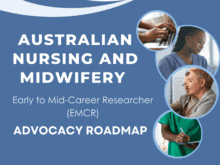Implementation Science
How do we ensure important research is put into practice quickly and effectively? We need to look at how practitioners work and what they need, to make it easy for them to adopt new practices.
We need to look at ways we can adapt and scale new information so that more practitioners can access it in whichever way best works for them. The easier the implementation, the better the practice, and the greater the health of all Australians.
Need an Implementation Scientist to collaborate on your project? Are you looking to incorporate implementation science into your grant submission? If yes, click the button below to complete our short form and a SPHERE team member will be in contact to discuss further.

As healthcare systems continue to work under increasingly dynamic and resource-constrained conditions, evidence-based strategies are essential in order to ensure that research investments maximise healthcare value and improve public health. Implementation science plays a critical role in understanding how to support the uptake of evidence into routine clinical practice.
Our Implementation Science Platform features two key structures: the Implementation Science Collaborative and the Nursing and Midwifery Implementation Science Academy.
The Collaborative connects implementation scientists, clinicians, and leaders to promote knowledge exchange and equip them with tools to integrate evidence into practice.
The Academy unites nurses and midwives from academia, clinical practice, and management to improve patient outcomes, advance healthcare delivery, and influence health policy, with a focus on advocacy, research, education, and capacity building.
Together, these initiatives are transforming healthcare through collaboration and evidence-based practice.
Our Vision

Our Vision
Our vision is to be a driving force in supporting the application of proven strategies for translating evidence into clinical practice. We aim to provide support through implementation science research methods and lead transformative, multidisciplinary implementation research collaborations through SPHERE’s Implementation Science Collaborative (‘IS Collaborative’), and Nursing & Midwifery Implementation Science Academy (‘The Academy’).
Our Focus
Our Focus
The Implementation Science Platform has three priority areas with the aims of each outlined below:
1. Collaboration
- We connect implementation scientists to clinician researchers who would like to incorporate implementation methods, tools, and expertise into their practice, projects, and grant submissions.
- We work with SPHERE network members to facilitate the integration of an implementation thread into funding applications and ensure implementation science is appropriately represented to provide the best chance of success.
2. Capacity Building
- As members of SPHERE continue to gain skills, experience and enthusiasm for implementation science through working with us, we provide a dedicated space to further develop, connect, and grow in this field.
- Across our Nursing and Midwifery Academy (‘The Academy’) and Implementation Science Collaborative (‘IS Collaborative’) initiatives, we provide mentorship, skill development, networking, and capacity building opportunities and resources, as voted for and co-designed by our members, for those wishing to grow their expertise and reputation in implementation science.
3. Impact
- Implementation science is still a relatively new field. One of our key goals is to demonstrate its value on embedding research evidence into practice, and how clinicians and researchers can get the best out of their implementation scientist to maximise the sustained impact of their innovation in the real world.
- Through formal evaluation, we aim to demonstrate the difference that the SPHERE implementation science platform has made to collaboration, capacity building, and embedding evidence into practice.
Implementation Science Collaborative
What is the Implementation Science Collaborative?
The SPHERE Implementation Science Collaborative (‘IS Collaborative) is part of SPHERE’s Implementation Science Platform. This dynamic initiative is aimed at fostering collaboration and knowledge exchange among implementation scientists, clinicians, and leaders, and empowering clinicians and researchers with implementation science tools to help embed evidence into practice.
Together we are combining our skills and experience of implementation research and practice across healthcare to support clinicians and researchers, and each other, through knowledge sharing, capacity building, and impact evaluation.
Connect with an Implementation Scientist
Need an Implementation Scientist to collaborate on your project?
Are you looking to incorporate implementation science into your grant submission?
If yes, click the button below to complete our short form and a SPHERE research support officer will be in contact to set up an initial meeting, or to discuss further.
collaborate with an implementation scientistOur Team
Members of the Implementation Science Collaborative (not listed above) include Angela Kelly-Hanku, April Morrow, Caleb Ferguson, Carmen Crespo, Carolyng Mazariego, David Peiris, Gemma McErlean, Guillame Fontaine, Sarah Kennedy, Hueiming Liu, Lauren Christie, Merran Findlay and Michael Hodgins.
Collaborative Initiatives
Capacity Building
We undertook a survey of the collaborative to find out what emerging implementation scientists want out of a capacity building support package.
Key Findings:
- 83% wanted to be mentored/mentor
- Top 5 priority areas included
- Identifying and establishing collaborations
- Guidance for initial meeting with collaborators
- Budget allocation for implementation science research
- Adaptable problem-solving during implementation
- Working with diverse stakeholders (eg. providers, policymakers and consumers)
- Developed as a multicomponent EMCR support package
Advancing the field of Implementation Science
The IS Collaborative works together to generate manuscripts to advance implementation research and practice, including useful tools to support clinicians and researchers who want to work with us.
View the Critical actions for embedding research evidence into practice resource
Evaluation and Impact Assessment
Led by Dr Rachel Baffsky (EMCR Deputy Director of the IS Platform), we are using logic modelling to plan and monitor the impact of the IS Collaborative.
How to join the Implementation Science Collaborative?
Please complete the Member Expertise Survey
Nursing & Midwifery Implementation Science Academy
The Nursing & Midwifery Implementation Science Academy
The Maridulu Budyari Gumal, the Sydney Partnership for Health, Education, Research and Enterprise (SPHERE) Nursing & Midwifery Implementation Science Academy (‘The Academy’) brings together over 40 nurses and midwives from academia, clinical practice, and senior management to drive improved patient outcomes, superior healthcare delivery, and health policy changes. Focused on engagement and advocacy; research and policy; education and training, the Academy fosters mentorship, capacity building, and partnerships. The Academy is helping to bridge the translation gap between research and clinical care, offering a unique platform for nurse and midwife leaders across the greater Sydney basin to collaborate and transform healthcare.
The Academy has developed a Nursing and Midwifery Clinician Researcher Career Pathway, a newly proposed 12-year progressive training and career pathway from internships to graduate education at Honours, Masters or Doctoral level to post-doctoral levels of research career development for nurses and midwives.
Clinician Researcher Pathway
Building research capacity and capability in nursing and midwifery.
To address complex health challenges more clinician researchers are needed. The SPHERE Nursing and Midwifery Clinician Researcher Career Pathway is a newly proposed 12-year progressive training and career pathway from internships to graduate education at Honours, Masters or Doctoral level to post-doctoral levels of research career development for nurses and midwives. The Pathway aims to transform the number of nurses and midwives within Local Health Districts with higher degrees in research. It also incorporates a Clinical Researcher Capability Framework. At this time, the Pathway is not funded but advocacy efforts are on-going at state and national level. Some local hospitals and health districts fund individual components of the Pathway while full funding is being sought – check with your local health district for these opportunities.
At this time, the Pathway is not funded but advocacy efforts are on-going at state and national level. Some local hospitals and health districts fund individual components of the Pathway while full funding is being sought – check with your local health district for these opportunities.
Our Research
Research led by the SPHERE Nursing & Midwifery Implementation Science Academy ‘Exploring the SPHERE Nursing and Midwifery Clinician Researcher Career Pathway: A qualitative study’ sought to describe the proposed Pathway in more detail. This research examined the viewpoints of nursing and midwifery service leaders and academics, yielding valuable insights into their assessment of the Pathway’s acceptability and feasibility.
In subsequent research, the investigators further explored opportunities to embed this Pathway into practice ‘Pre-implementation context and implementation approach for a nursing and midwifery clinician researcher career pathway: A qualitative study’. Despite the growing influence of nurse and midwifery clinician researchers in improving patient outcomes, enhancing care delivery and reducing healthcare costs there are limited career pathways for them in clinical practice. Using a qualitative descriptive design, data were collected from focus groups and interviews with health consumers, clinicians, and managers. The findings highlighted the Pathway was perceived by many healthcare leaders as an additional opportunity to meet organisational goals and would foster a significant cultural change, with crucial protected research time. It was perceived as a tool to empower nurses and midwives, enhance retention, and improve patient care by integrating evidence-based practice.
References
- Johnson, M., et al. (2023). “Exploring the SPHERE nursing and midwifery clinician researcher career pathway: A qualitative study.” Collegian 30(6): 795-804. https://doi.org/10.1016/j.colegn.2023.06.002
- Johnson, M., et al. (2024). “Pre‐implementation context and implementation approach for a nursing and midwifery clinician researcher career pathway: A qualitative study.” Journal of Advanced Nursing. https://doi.org/10.1111/jan.16307
Academy Members
We would like to acknowledge the valuable contribution of the SPHERE Nursing and Midwifery Implementation Science Academy members who contributed to the research including Professor Sandy Middleton, Professor Caleb Ferguson, Professor Elizabeth McInnes, Professor Maree Johnson, Dr Nicola Straiton, Julie Gawthorne, Anna Thornton, Browyn Everett, Karen Tuqiri, Shahla Meedya, Lin Perry, Kate Hackett, Marilyn Cruickshank, Margaret Fry, Suzanne Sheppard-Law, Annmarie Hosie, Sally Inglis, Gemma McErlean, Deborah Debono, Ritin Fernandez, Rochelle Wynne, Josephine Chow, Louise Hickman and the support of Maridulu Budyari Gumal, the Sydney Partnership for Health, Education, Research and Enterprise (SPHERE).
Contact us
If you would like to discuss research projects and the ‘Clinician Researcher Pathway’ in more detail contact Professor Sandy Middleton: [email protected]; Professor Caleb Ferguson: [email protected]; or Dr Nicola Straiton: [email protected].





